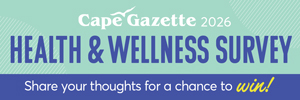As the coronavirus pandemic continues to wreak havoc, healthcare facilities in Sussex carry the brunt of the most intense effects of the highly contagious disease. Beebe Healthcare, Bayhealth and TidalHealth, and their thousands of dedicated employees and providers, have to contend with straining capacity due in large part to dealing with COVID-19.
Some cases involve vaccinated yet still infected patients. Most, we’re told, involve unvaccinated patients. The recent but now declining spike in cases resulted in another cycle of on-again, off-again postponements of elective surgeries, which can cause cascading health issues.
The Sussex community would benefit from knowing what percentage of COVID-19 patients being treated in these facilities involves people who have chosen not to get vaccinated. Despite the anonymous nature of percentages, the three systems mentioned don't reveal those statistics. In so choosing, they miss an opportunity to provide a realistic reality check – within the bounds of fluctuating daily ranges – on just how severely the community is being affected by those resisting the proven benefits of vaccination.
We hear the percentage of cases involving unvaccinated people is high, but what does that mean? It’s one thing if high means greater than 50 percent, but another thing entirely if high means 98 percent. The community’s sense of urgency depends on the accuracy and completeness of the information it receives.
Similarly, Beebe and Bayhealth resist revealing what percentage of their employees has been vaccinated. Again, we’re told the number is high - in Beebe’s case higher than 79 percent - but that’s too vague to be meaningful when we’re talking thousands of employees. It sows doubt in an inquiring community looking to their healthcare providers as their most knowledgeable healthcare partners.
These systems are educating and encouraging employees to vaccinate if possible. In compliance with state guidelines, they have ordered either vaccination or evidence of weekly testing. However, weekly testing doesn’t catch exposure or infection occurring a day or two after the test.
Our healthcare systems’ officials should err on the side of transparency, so people can better assess and manage their own risk when interacting with the institutions where most have placed their trust throughout their lives.























































